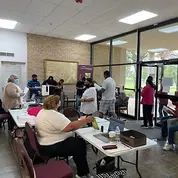
Healthcare Management Company
Services
Mobile Clinic
RedTag-19 and its management team have multiple decades of experience providing comprehensive medical services in hospital and healthcare related facilities, specializing in full health & medical turnkey solutions and the provision of services as a surge capacity provider.. Most recently, in coordination with local, state and federal emergency COVID-19 response services in Texas, RedTag-19 has provided urgent/emergent care services across the entire state.

RedTag-19 can rapidly and efficiently deliver urgent or primary care services to a community using a fully equipped mobile clinic van especially when disaster strikes.
RedTag-19 has the resources available to efficiently bring high-quality primary care services to vulnerable patients and underserved communities and populations, reducing health disparities and the risk of poor health outcomes, and ensuring access to continuity of care and the ability to pursue healthier living.
Our mobile medical clinics are an innovative solution to provide healthcare services directly to communities, especially those with limited access to traditional healthcare facilities.
Here are some key points about mobile medical clinics:
Accessibility: Mobile clinics bring healthcare services to underserved areas, including rural and urban communities, ensuring that people who might not otherwise have access to care can receive medical attention.
Services Offered: These clinics can provide a wide range of services, including primary care, urgent care and mental health services.
Flexibility: Mobile clinics can be deployed quickly in response to emergencies or public health crises, such as natural disasters or pandemics.
Cost-Effective: By reducing the need for patients to travel long distances for care, mobile clinics can lower healthcare costs and improve health outcomes.
Community Impact: Our state and local government partnerships address specific health needs within the community, making healthcare more personalized and effective.
RedTag-19 has successfully completed over 650 mobile COVID-19 vaccination clinics in partnership with Texas Human Health Services across the entire state of Texas.
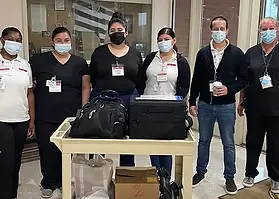
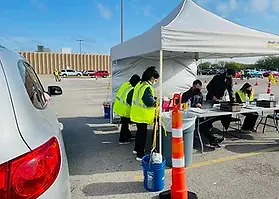
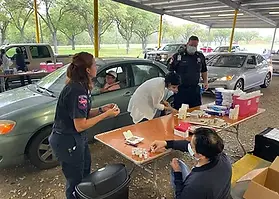
COVID-19 screening and vaccination at Sheriff's Office, Fort Bend County, Texas
Our team successfully executed a drive through COVID-19 vaccination event for over 2000 Tyson Food employees.
Drive through COVID-19 vaccination event for over 1000 residents of Colorado County, Texas in partnership with local EMS.
Correctional Facility:
Primary Care, Urgent Care, Mental Health Screening
Our team has a deep understanding of the mental health and social perceptions and biases at work in offenders, as well as an understanding of prison culture, norms and procedures. Our highly skilled team has performed COVID-19 vaccinations for most correctional facilities across the state of Texas.
Our team is committed to the safety of public and determined to provide care in underserved and vulnerable communities to extent of providing vaccination to an inmate in solitary confinement.
Correctional health services are essential for providing medical care to individuals in correctional facilities. Here are some key aspects:
Comprehensive Care: These services include medical, mental health, dental, and substance use treatment. They aim to address the diverse health needs of incarcerated individuals.


Our team is committed to the safety of public and determined to provide care in underserved and vulnerable communities to extent of providing vaccination to an inmate in solitary confinement.
Correctional health services are essential for providing medical care to individuals in correctional facilities. Here are some key aspects:
Comprehensive Care: These services include medical, mental health, dental, and substance use treatment. They aim to address the diverse health needs of incarcerated individuals.
Inmate being vaccinated in solitary confinement
Primary Care
Primary care services are the cornerstone of healthcare, providing comprehensive and continuous care to patients. Here are some key aspects:
-
Preventive Care: This includes routine check-ups, immunizations, screenings, and health education to prevent illnesses and maintain overall health.
-
Management of Chronic Conditions: Primary care providers (PCPs) help manage chronic diseases such as diabetes, hypertension, and asthma through regular monitoring and treatment plans.
-
Acute Care: PCPs treat common illnesses and injuries, such as infections, minor injuries, and acute conditions like the flu.
-
Coordination of Care: They coordinate with specialists and other healthcare providers to ensure comprehensive care, especially when specialized treatment is needed. Patient Education: Educating patients about healthy lifestyle choices, disease prevention, and management of health conditions is a crucial part of primary care.
Primary and Urgent Care
Urgent care centers are medical facilities designed to provide immediate treatment for non-life-threatening conditions. Here are some key points about urgent care:
-
Types of Conditions Treated: Urgent care centers handle illnesses and injuries that require prompt attention but are not severe enough to warrant a visit to the emergency room. This includes conditions like minor fractures, sprains, cuts, burns, infections, and flu-like symptoms.
-
Accessibility: These centers are typically open seven days a week with extended hours, making them a convenient option for those who need medical attention outside of regular office hours.
-
Services Offered: Urgent care centers often provide a range of services, including X-rays, lab tests, vaccinations, and treatment for common illnesses and injuries.
-
Staffing: They are usually staffed by physicians, nurse practitioners, and physician assistants who can diagnose and treat a variety of medical issues.
-
Cost and Wait Times: Urgent care visits are generally less expensive and have shorter wait times compared to emergency room visits.
Urgent care centers are a great option when you need quick medical attention, but your condition isn’t severe enough for the emergency room.
Physician-owned and operated 4 urgent cares offering comprehensive services such as primary care, acute care, urgent care, immigration physicals, preventive care, mental health screening, immunizations, labs services, pharmacy on site. Governed adult and pediatric emergency room operations while furnishing a vast perspective on treating patients, and instituting protocols at the facility.
Expanded the enterprise to four locations which enticed competitor acquisition of the company. Fabricated standardized care procedures while preceding overall clinicians. Formulated policies that adhered to efficiency, care, dignity, and privacy while attending patients in an atmosphere that is friendly, competent, safe, and impressive. Coordinated clinic administration, encompassing financial oversight, training, hiring, program development, human resources, and policy planning.

Established municipal and state compliance procedures, including ACHA, while monitoring staff education and certifications. Analyzed and evaluated test findings to determine diagnosis and treatment solutions. Cultivated and oversaw clinical departments through recruiting, training, and evaluating staff.
Primary and Urgent Care Services
-
Hypertension Management
-
Incision and Drainage
-
Ingrown Toenail
-
Oral Pain
-
Oral Yeast Infection
-
Otitis Externa
-
Paronychia
-
Pregnancy Test
-
Wound Care
-
Laceration Repair
-
Acute Otitis Media
-
Allergic reaction
-
Asthma -Burn (Minor)
-
Conjunctivitis
-
COVID-19 testing, treatment
-
Diabetic Management
-
Influenza Testing and Treatment
-
Foreign Body Removal
-
Sexually transmitted infection (STI) (presumptive diagnosis and treatment)
-
Strep A (throat) (point of care test and treatment)
-
Tetanus Prophylaxis
-
Upper Respiratory Infection
-
Urinary Tract Infection
-
Vaginal Yeast Infection
Mental Health
Mental health services encompass a wide range of support and treatment options for individuals experiencing mental health issues. Here are some key aspects:
-
Counseling and Therapy: This includes individual, group, and family therapy sessions with licensed professionals to address issues like anxiety, depression, trauma, and relationship problems.
-
Psychiatric Services: Psychiatrists provide medical evaluations, diagnose mental health conditions, and prescribe medications to manage symptoms.
-
Crisis Intervention: Immediate support for individuals experiencing a mental health crisis, such as suicidal thoughts or severe anxiety attacks.
-
Case Management: Assistance in coordinating care, accessing resources, and navigating the healthcare system to ensure comprehensive support.
-
Peer Support: Programs where individuals with lived experience of mental health issues provide support and guidance to others going through similar challenges.
-
Rehabilitation Services: Support for individuals recovering from severe mental health conditions to help them reintegrate into the community and improve their quality of life.
Immigration Physicals
-
Immigration health services are crucial for ensuring the well-being of immigrants, refugees, and migrants. Here are some key aspects:
-
Health Screenings: Immigrants and refugees often undergo health screenings before and after arrival to identify and treat any infectious diseases, ensuring they do not pose a public health risk.
-
Vaccinations: Immunizations are a critical part of the health requirements for immigrants and refugees. These vaccinations help protect both the individuals and the communities they join.
-
Access to Healthcare: Legal immigrants can access healthcare through various programs, including Medicaid and the Health Insurance Marketplace. However, undocumented immigrants face significant barriers to accessing healthcare services.
-
Mental Health Services: Many immigrants and refugees experience trauma and stress related to their migration journey. Providing mental health support is essential for their overall well-being.
-
Health Education: Programs aimed at educating immigrants about the healthcare system, preventive care, and healthy living practices are vital for integrating them into their new communities.
Covid-19 & Monkey Pox Vaccination
Mobile Pop-Up Clinics
COVID-19 care services encompass a range of medical and support services designed to manage and treat COVID-19. Here are some key aspects:
-
Testing and Diagnosis: This includes PCR tests, rapid antigen tests, and antibody tests to detect current or past infections.
-
Treatment Options: Depending on the severity of the illness, treatments can range from home care for mild cases to hospitalization for severe cases. Treatments may include antiviral medications, monoclonal antibody therapy, and supportive care such as oxygen therapy.

-
Vaccination: Vaccination services are crucial for preventing severe illness and reducing the spread of the virus. Booster shots are also available to enhance immunity.
-
Telehealth Services: Many healthcare providers offer virtual consultations to manage COVID-19 symptoms and provide medical advice without the need for in-person visits.
-
Infection Control: Guidelines and practices to prevent the spread of COVID-19, including the use of personal protective equipment (PPE), isolation protocols, and hygiene practices.
-
Support Services: This includes mental health support, community resources, and assistance with daily needs for those affected by COVID-19.

Monkeypox (now often referred to as Mpox) healthcare services are designed to manage and prevent the spread of the virus. Here are some key aspects:
-
Vaccination: The JYNNEOS and ACAM2000 vaccines are available to prevent Mpox. These vaccines are distributed through health departments and public health clinics.
-
Testing: Diagnostic tests are available to confirm Mpox infection. These tests can be accessed through primary care providers, community clinics, and specialized infectious disease clinics.
-
Treatment: While there are no specific treatments for Mpox, antiviral drugs developed for smallpox, such as Tecovirimat (TPOXX), can be used to treat severe cases.
-
Infection Control: Healthcare settings follow strict infection control guidelines to prevent the spread of Mpox. This includes isolation of infected patients, use of personal protective equipment (PPE), and environmental cleaning4. Public Health Response: The U.S. Department of Health and Human Services (HHS) has implemented a multi-pronged response to combat Mpox, including increasing vaccine supply, expanding testing availability, and raising public awareness.
Per DSHS, our team administered"MOST NUMBER OF VACCINES"
amongst all its partners.
Over 650 pop up COVID-19 vaccination clinics were set up in the span of 2 years in partnership with Department State Health Services and Texas Human Health Services across the entire state of Texas. The goal was to primarily serve the underserved population and communities without access to vaccines. RedTag-19 offered end to end solution to assist the state's efforts to educate its population, create awareness of the crisis, staff the pop-up clinics, maintain cold chain for vaccine viability, maintain detailed records of the vaccination event and inventory of vaccines. Our management team was intrinsically involved in weekly DSHS meetings to create plan for outreach and discuss logistics of the event.
Immigration Physicals I Border Health
I Refugee Health
Services
Health assessments
Detection and Management of Communicable
Diseases
Laboratory testing
Immunizations
Health education
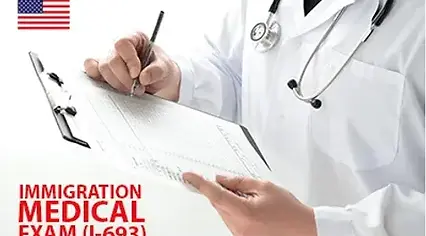
Our Technology partner e medical practice fully integrated EHR
-
FULLY INTEGRATED EHR
-
PRACTICE MANAGEMENT SOFTWARE
-
REVENUE CYCLE MANAGEMENT
-
INTEGRATED E-PAYMENTS
-
MIPS REGISTRY
-
TELEMEDICINE CAPABILITIES
-
REMOTE PATIENT MONITORING
-
PATIENT PORTAL
-
ELECTRONIC PRESCRIPTIONS
-
INVENTORY MANAGEMENT

Emergency Medical Crisis Management
Emergency medical crisis management services are designed to provide immediate and effective response to various types of emergencies such as hurricanes, storms, floods, earthquakes, fires. Here are some key components:Emergency Medical Services (EMS): EMS includes highly skilled pre-hospital clinicians who respond to emergencies, providing critical care and transportation to medical facilities. They work closely with other emergency responders like law enforcement and fire services.
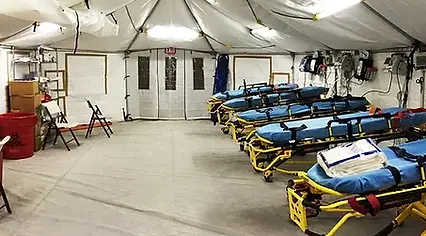
Crisis Response Models: An integrated approach involving EMS, mental health professionals, and sometimes law enforcement is ideal for managing mental health crises. This model ensures high-quality support and access to necessary mental and behavioral healthcare.Crisis Call Centers: These centers accept all calls and dispatch support based on the assessed need of the caller. They provide assessment, screening, triage, preliminary counseling, and information and referral services.Mobile Crisis Teams: These teams are dispatched to the location of the crisis, providing immediate on-site support and intervention. They are crucial for situations that do not require hospital emergency department visits.Crisis Receiving and Stabilization Facilities: These facilities offer immediate care for individuals in crisis, regardless of the referral source. They provide a safe environment for stabilization and further treatment planning.Community Paramedicine: Also known as Mobile Integrated Healthcare (MIH), this model involves EMS clinicians providing care outside the emergency response system, often through scheduled visits in the patient’s home. This approach helps underserved populations access healthcare and reduces emergency calls.
Rural Healthcare Services
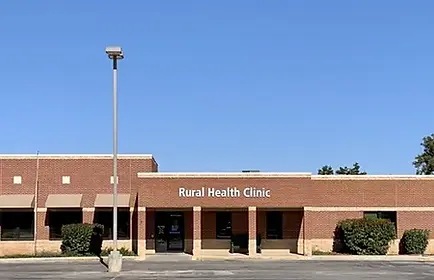
Rural health care services are designed to address the unique challenges faced by residents in rural areas. Here are some key aspects:Access to Care: Rural residents often face barriers such as long distances to healthcare facilities, limited transportation options, and fewer healthcare providers1. Efforts to improve access include mobile clinics, telehealth services, and expanding the number of rural health clinics (RHCs). Rural Health Clinics (RHCs): These clinics aim to increase access to primary care services in rural communities.
They can be public, nonprofit, or for-profit and must be located in underserved or shortage areas2. RHCs use a team approach, involving physicians, nurse practitioners, physician assistants, and certified nurse midwives.Telehealth: Telehealth services have become increasingly important in rural areas, allowing patients to consult with healthcare providers remotely. This helps overcome the barrier of distance and provides access to specialists who may not be available locally.Workforce Shortages: Rural areas often struggle with a shortage of healthcare professionals. Programs like the National Health Service Corps offer incentives such as loan repayment and scholarships to encourage providers to work in rural settings.Community Health Programs: These programs focus on preventive care, health education, and chronic disease management. They often involve partnerships with local organizations to address specific health needs within the community.
Remote Patient Monitoring
Remote patient monitoring (RPM) is a healthcare delivery method that uses technology to monitor patients outside of traditional clinical settings. Here are some key aspects:How It Works: RPM involves the use of digital devices like weight scales, blood pressure monitors, pulse oximeters, and blood glucose meters to collect patient data. This data is then transmitted to healthcare providers for monitoring and analysis.Benefits for Patients: RPM allows patients to receive high-quality care from the comfort of their homes, reducing the need for frequent hospital visits.
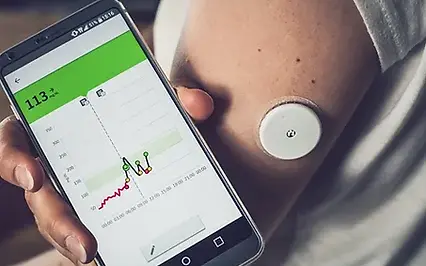
It is particularly beneficial for managing chronic conditions such as diabetes, hypertension, and heart disease.Benefits for Providers: Healthcare providers can closely monitor patients’ health in real-time, allowing for timely interventions and adjustments to treatment plans. This can lead to better health outcomes and reduced healthcare costs.Technology Used: Common RPM devices include blood pressure monitors, glucometers, pulse oximeters, and specialized monitors for conditions like sleep apnea and heart disease.Applications: RPM is used for a variety of conditions, including high blood pressure, diabetes, chronic obstructive pulmonary disease (COPD), and asthma. It is also used in post-surgical care and for monitoring patients with severe chronic illnesses.





